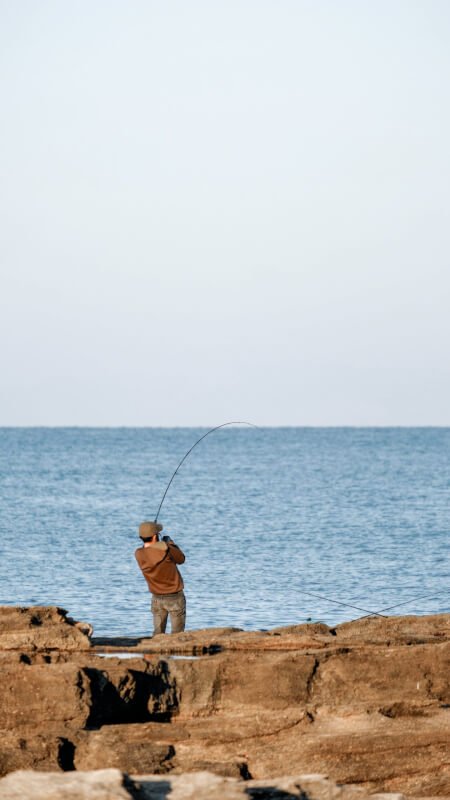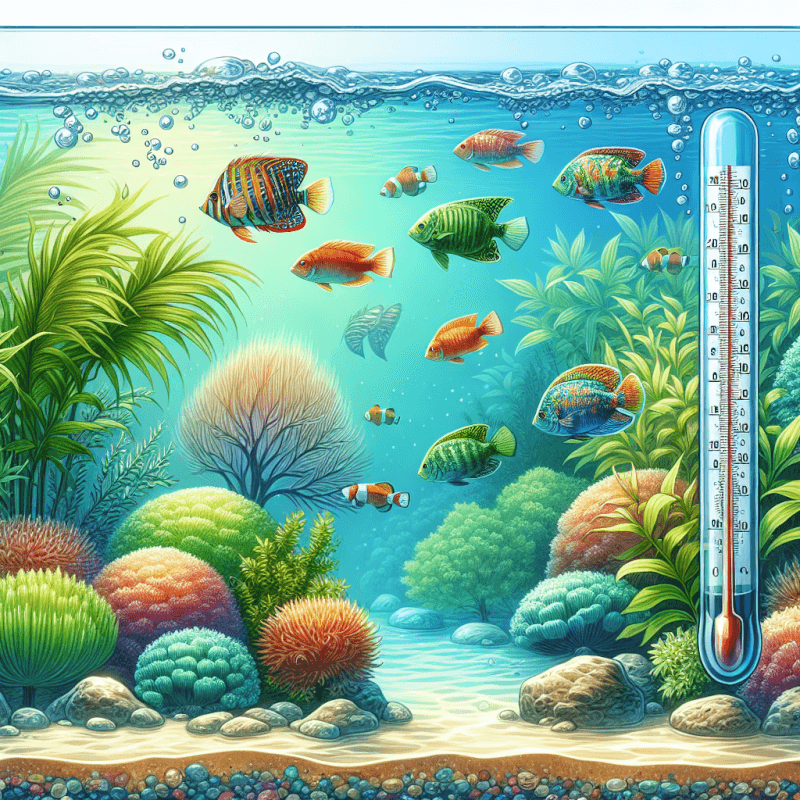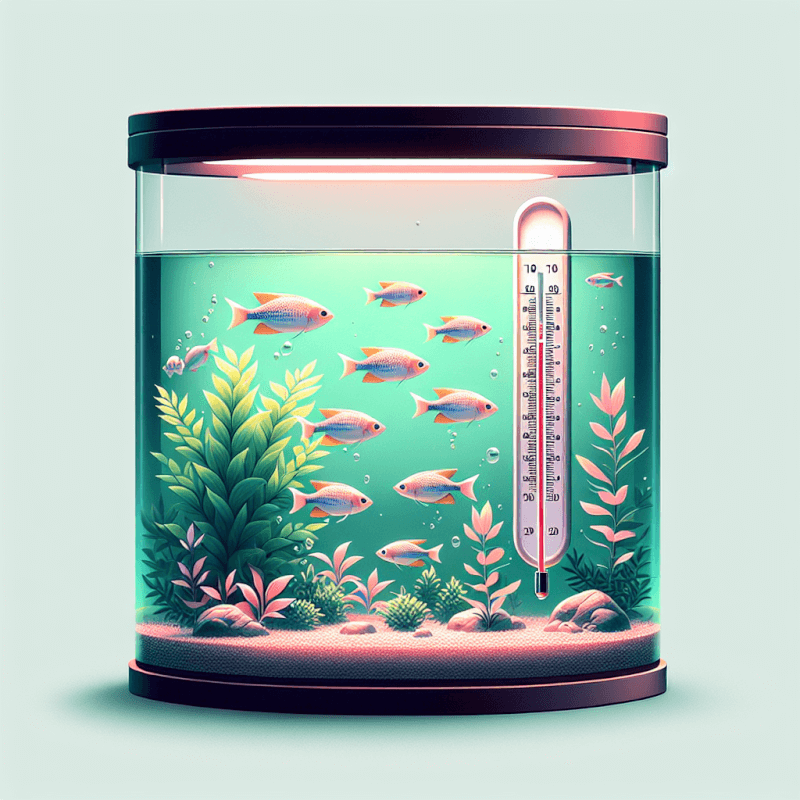Are you a tropical fish enthusiast looking to create the perfect environment for your underwater friends? Well, the ideal water temperature for tropical fish might just be the missing piece of the puzzle. Ensuring that your fish are comfortable and thrive in their habitat is crucial, and understanding the importance of water temperature is key to achieving this. In this article, we will explore the ideal water temperature for tropical fish, helping you provide the optimal conditions for your aquatic companions to flourish. So, let’s dive right in and discover the temperature that will make your fish feel right at home!
Factors Affecting Water Temperature for Tropical Fish
When it comes to keeping tropical fish in an aquarium, maintaining the ideal water temperature is essential for their overall health and well-being. Several factors contribute to the optimal water temperature for different types of tropical fish. Understanding these factors and taking appropriate steps to maintain the right temperature will ensure your fish are happy and thriving in their aquatic environment.
Ready for Cat Trivia?
Test your knowledge about cats!

Types of Tropical Fish
Tropical fish can be broadly classified into two categories based on their preferred water temperature: warm-water fish and cold-water fish.
Warm-Water Fish
Warm-water fish, as the name suggests, thrive in higher water temperatures. They typically prefer temperatures in the range of 75-80°F (24-27°C). Some popular warm-water fish species include guppies, tetras, danios, and swordtails. These fish originate from tropical regions where the water temperature is consistently warm.
Cold-Water Fish
On the other hand, cold-water fish are more suited to lower water temperatures. They prefer temperatures between 60-70°F (15-21°C). Certain cold-water fish, such as goldfish and koi, are hardy and can tolerate a wider range of temperatures. However, it is still crucial to maintain a stable and appropriate water temperature for their optimum health.
Temperature Range
While these temperature ranges provide a general guideline, it is essential to research and understand the specific temperature preferences of the tropical fish species you plan to keep. Some species may have slightly different temperature requirements within the warm-water or cold-water categories.

Natural Habitat
To recreate the ideal environment for tropical fish, it is crucial to consider their natural habitat and the water conditions they are accustomed to.
Tropical Rivers
Many tropical fish, such as angelfish and gouramis, originate from rivers with warm water temperatures. These rivers often have temperatures that range from 75-80°F (24-27°C). Therefore, replicating these conditions in their aquarium will help them thrive.
Coral Reefs
Some tropical fish species are native to coral reefs, where the water temperature can vary. However, most coral reef fish prefer warmer waters ranging from 78-82°F (26-28°C). Providing a stable temperature within this range is vital to ensure their comfort and reduce stress.
Lakes and Ponds
Certain tropical fish species can be found in lakes and ponds with varying water temperatures. For example, some cichlids prefer slightly cooler temperatures around 70-75°F (21-24°C). Researching the natural habitat of the fish you plan to keep will help you determine the optimal temperature range.
Estuaries and Mangroves
Estuaries and mangroves are habitats for tropical fish that can tolerate both saltwater and freshwater environments. The water temperature in these areas can range from 70-80°F (21-27°C). If you plan to keep fish that inhabit these habitats, maintaining appropriate temperatures within this range is crucial.
Determining Optimal Temperature
To determine the ideal water temperature for your tropical fish, it is essential to research their natural habitat and the temperature range they are exposed to in the wild. Understanding the specific requirements of your fish species will help you make informed decisions about the temperature you should maintain in your aquarium.
Aquarium Size
The size of your aquarium plays a significant role in determining the water temperature and its stability. The water volume in the tank affects how efficiently the temperature can be regulated.
Small Aquariums
In small aquariums, the water temperature can fluctuate more easily due to the limited volume of water. It is crucial to have a reliable and accurate thermometer to closely monitor the temperature and make timely adjustments, if needed.
Medium Aquariums
Medium-sized aquariums provide a more stable water temperature compared to smaller ones. The larger water volume helps to minimize temperature fluctuations, providing a more consistent and comfortable environment for your fish.
Large Aquariums
Large aquariums, with their substantial water volume, offer the most stable water temperatures. They have a higher heat retention capacity, meaning that any changes in room temperature or heating equipment will have a slower impact on the water temperature. However, it is still important to monitor and maintain the desired temperature to ensure the well-being of your fish.
Temperature Stability
Regardless of the size of your aquarium, it is crucial to maintain temperature stability. Rapid changes in water temperature can stress the fish and lead to various health issues. Regular monitoring, combined with appropriate heating equipment, will help ensure a stable and suitable temperature for your tropical fish.

Water Chemistry
Apart from the water temperature, the chemistry of the water in your aquarium is another critical factor in providing the optimal environment for tropical fish.
pH Level
Different fish species have different pH level preferences. Generally, a pH range of 6.5-7.5 is suitable for most tropical fish. However, specific species may require more acidic or alkaline conditions. Maintaining the correct pH level is essential for their overall health and well-being.
Hardness
Water hardness refers to the mineral content in the water, primarily calcium and magnesium ions. Some tropical fish, such as livebearers like mollies and platies, prefer harder water, while others, like tetras and angelfish, thrive in softer water. Understanding the preferred water hardness of your fish species will help you adjust it accordingly.
Ammonia and Nitrate Levels
Ammonia and nitrate levels should be kept at appropriate levels to ensure a healthy aquatic environment. High levels of ammonia and nitrate can be toxic to fish. Regular water testing and appropriate filtration mechanisms will help maintain optimal water chemistry.
Maintaining Optimal Water Chemistry
To keep the water chemistry in check, regular water testing is essential. Test kits are readily available at pet stores and can help you monitor pH, hardness, ammonia, and nitrate levels. Making necessary adjustments, such as using buffers or adding chemicals, should be done cautiously and in consultation with experts if necessary.
Heating Equipment
To regulate and maintain the desired water temperature, various heating equipment options are available for aquariums.
Immersion Heaters
Immersion heaters are submersible and are placed directly in the water. They contain a heating element that warms the water around it. Immersion heaters are commonly used in small aquariums and are easy to install and adjust.
Submersible Heaters
Similar to immersion heaters, submersible heaters are also placed directly in the water. However, they typically have more features, such as adjustable temperature settings and automatic shut-off functions. Submersible heaters are available in a range of sizes to suit different aquariums.
Heating Mats
Heating mats, also known as heat pads or heat strips, are placed under the aquarium to warm the water indirectly. They provide gentle and consistent heat. Heating mats are commonly used in smaller aquariums and are an ideal choice for aquariums with delicate plants or bottom-dwelling fish.
Thermostats
Thermostats are devices that control the temperature of the heating equipment. They help maintain a stable and desired water temperature by regulating the on and off cycles of the heater. Thermostats are crucial in preventing overheating and ensuring the safety of your fish.
Temperature Controllers
Temperature controllers provide more advanced temperature regulation for larger aquariums or for those with a greater number of fish. They work in conjunction with heating equipment and employ sensors to monitor and adjust the temperature automatically. Temperature controllers provide precise control and added peace of mind.

Determining the Ideal Water Temperature
Determining the ideal water temperature for your tropical fish requires a combination of research, expert advice, and adapting to the specific needs of your fish.
Researching Fish Species
Thoroughly researching your fish species is crucial in understanding their temperature preferences. Investigate their natural habitat, habitat conditions, and any specific temperature requirements. This information will guide you in maintaining the ideal water temperature in your aquarium.
Consulting Experts
If you’re unsure about the temperature requirements of your fish species or need guidance in setting up and maintaining the right water temperature, consult with experts in the field. Aquarium professionals or knowledgeable staff at pet stores can provide valuable insights and advice to ensure the well-being of your fish.
Adapting to Specific Fish Needs
Each fish species has its distinct temperature preferences and requirements. Remain observant of your fish’s behavior, appetite, and overall health. Adjust the water temperature if necessary, while ensuring the changes are gradual to prevent stressing the fish. Adapting to the specific needs of your fish will help create a suitable and comfortable environment for them.
Caring for Warm-Water Fish
Warm-water fish thrive in higher water temperatures and have specific temperature requirements to stay healthy.
Recommended Temperature Range
Warm-water fish generally require a water temperature between 75-80°F (24-27°C). This temperature range helps support their metabolism, digestion, immune system, and overall well-being.
Maintaining Temperature Stability
To ensure that warm-water fish remain healthy, it is vital to maintain a stable water temperature within the recommended range. Use appropriate heating equipment, such as submersible heaters or immersion heaters, and regularly monitor the water temperature with a reliable thermometer.

Caring for Cold-Water Fish
Cold-water fish prefer lower water temperatures and require specific conditions to thrive.
Recommended Temperature Range
Cold-water fish generally require a water temperature between 60-70°F (15-21°C). It is important to remember that certain species, such as goldfish and koi, can tolerate a wider temperature range. However, maintaining temperatures within the recommended range will promote their overall health.
Maintaining Temperature Stability
To provide a suitable environment for cold-water fish, it is crucial to maintain a stable water temperature. A reliable thermometer should be used to monitor water temperature, and appropriate heating equipment should be used to maintain the desired range.
Monitoring and Adjusting Water Temperature
While setting the initial water temperature is important, it is equally crucial to monitor and make necessary adjustments over time to ensure the well-being of your fish.
Aquarium Thermometers
Using a reliable and accurate aquarium thermometer is essential in monitoring water temperature. Digital or analog thermometers can be placed inside the aquarium to provide a continuous reading. Regularly check the thermometer and note any fluctuations in temperature.
Temperature Fluctuations
Temperature fluctuations can occur due to various factors, such as changes in room temperature, heating equipment malfunctions, or seasonal changes. Keep a close eye on the water temperature and make necessary adjustments when needed. Gradual changes are recommended to prevent stress on the fish.
Seasonal Changes
Seasonal changes can influence the water temperature in an aquarium, especially if the tank is located near windows or exposed to direct sunlight. During warmer seasons, you may need to adjust your heating equipment or take measures to prevent overheating. Similarly, during colder seasons, additional heating may be required to maintain the desired temperature.
Acclimating New Fish
When introducing new fish to your aquarium, it is essential to acclimate them gradually to the existing water temperature. Sudden temperature changes can be harmful to the fish. Float the fish bag in the aquarium for around 15-20 minutes to allow the water temperatures to equalize. Slowly add small amounts of aquarium water to the bag at regular intervals before releasing the fish into the tank.
In conclusion, maintaining the ideal water temperature is crucial for the health and well-being of tropical fish. Factors such as the type of fish, their natural habitat, aquarium size, water chemistry, and appropriate heating equipment all contribute to creating a suitable environment. Monitoring and adjusting the water temperature, as well as consulting experts and researching fish species, will help ensure your tropical fish thrive in their aquatic home. With proper care and attention to temperature, your fish will be happy and vibrant, providing you with hours of joy and relaxation as you witness their beauty in your own home aquarium.



